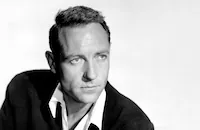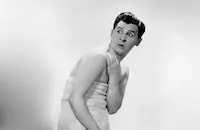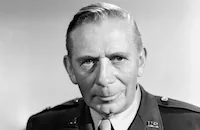Summer Stock

Brief Synopsis
Cast & Crew
Charles Walters
Judy Garland
Gene Kelly
Eddie Bracken
Gloria De Haven
Marjorie Main
Film Details
Technical Specs

Synopsis
Jane Falbury, a Connecticut farm owner, has worked hard to keep her family farm productive, but three years of bad crops have left her nearly destitute. Despite her financial crisis, Jane continues to pay for the expensive education of her sister Abigail, who is studying acting in New York. After her farm hands, Frank and Zeb, quit to take jobs in Hartford, Jane realizes that she must get an expensive tractor to help her with the heavy work on the farm. However, because she does not have enough money to pay for the new tractor, Jane tries to get a loan through her boyfriend, Orville Wingait, whose father, Japser G. Wingait, owns a general store in town and is a leader in the community. Jasper initially balks at Jane's extravagant request, but because he knows that his son is in love with Jane, he tells her that she can have the tractor if she consents to marry Orville. Jane refuses to accept Jasper's terms, but Jasper provides her with a new tractor regardless. Jane returns to her farm only to discover that it has been overrun by a troupe of actors that Abigail has brought in from New York to stage a musical in the farm's barn. Furious with Abigail for not asking her about the musical, Jane tells the troupe that they must leave. Joe D. Ross, who is Abigail's boyfriend and the director of the show, is also angry with Abigail for not having asked Jane's permission, but he uses his natural charm to persuade Jane to let them stay. Jane insists, however, that if the actors stay, they must perform some of the daily chores on the farm. The troupe begrudgingly agrees to the arrangement, and Jane immediately gives them lessons on how to maintain a working farm. One day, while helping her housekeeper, Esme, in the kitchen, Jane improvises a little tap dance, unaware that Joe is watching her. She becomes embarrassed when she notices Joe, but Joe admires her dancing and tells her that she has real talent. As word begins to spread through town that an acting troupe from New York is staying at Jane's farm, Jasper becomes concerned about the sudden influx of show business people in the quiet community. Jane is summoned to town to explain the situation and address the protests of the town leaders. Meanwhile, Herb Blake, one of the actors, accidentally crashes Jane's new tractor. When Jane returns to the farm and learns about the accident, she orders the troupe to leave and demands that Abigail stay on the farm to help her. Jane later reverses her decision when the troupe pools all its money to buy her a new tractor. Joe continues to encourage Jane's interest in the theater, and Jane and Joe soon realize their attraction for each other. When Abigail and Harrison I. Keath, the show's leading man, suddenly leave the farm to star in a play in New York, Joe decides to take over the male lead and asks Jane to take her sister's part. Orville sternly objects to Jane's involvement with the troupe, and when Jasper learns that Jane is in the show, he threatens to use his influence to stop it. Jane responds by threatening to call off her engagement to Orville. Just before the first performance of the show, Abigail returns to the farm and demands that Jane relinquish her role. Jane refuses to give up the part, and when Abigail sees that Jane is in love with Joe, she decides to stop interfering with their romance. Joe proposes marriage to Jane just before the show begins and Jane gladly accepts.

Director

Charles Walters
Cast

Judy Garland

Gene Kelly

Eddie Bracken

Gloria De Haven

Marjorie Main

Phil Silvers

Ray Collins

Nita Bieber

Carleton Carpenter

Hans Conried
Paul E. Burns

Bridget Carr
Jean Coyne
Carole Haney
Jean Adcock
Joanne Tree
Rena Lenart
Joann Dale
Betty Hannon
Elynne Ray
Marilyn Reiss
Dorothy Tuttle
Carol West
Arthur Loew Jr.
Eugene Freedley
Dick Humphreys
Don Powell
Joe Roach
Albert Ruiz
Jimmy Thompson
Erville Alderson
Bette Arlen
Bunny Waters
Alice Wallace
Meredith Leeds
Lorraine Crawford
Jack Gargan
Almira Sessions
Kathryn Sheldon
Michael Chopin
Teddy Infuhr
Cameron Grant
Jack Daley
Reginald Simpson
Eddie Dunn
Roy Butler
Henry Sylvester
George Bunny
Frank Pharr
Crew
Albert Akst
Harold Arlen
Hugh Boswell
Jack Brooks
Nick Castle
Saul Chaplin
Saul Chaplin
Otto Dyar
Cedric Gibbons
Sy Gomberg
Sy Gomberg
James Gooch
Mack Gordon
Johnny Green
Sydney Guilaroff
Henri Jaffa
Al Jennings
Ted Koehler
Tom Long
Skip Martin
Les Martinson
Bob Osgood
Helene Parrish
Joe Pasternak
Robert Planck
Walter Plunkett
Lew Roberts
Helen Rose
Joseph Ruttenberg
Conrad Salinger
Douglas Shearer
Harkness Smith
Jack Martin Smith
Alfred E. Spencer
John Truwe
William J. Tuttle
Harry Warren
George Wells
John A. Williams
Edwin B. Willis

Photo Collections
Videos
Movie Clip


Trailer
Film Details
Technical Specs

Articles
Summer Stock
As producer, Joe Pasternak was considered a bit formulaic and predictable in his day and actually had intended to do another Garland/Rooney picture, only Mickey wasn't drawing moviegoers as he once did, so Kelly was chosen instead. The musical star had just finished the innovative and much acclaimed On the Town (1949) and was less than interested in joining a Pasternak project, having already turned down one of the producer's earlier ideas as being passe. But he agreed to do the film as a favor to Garland, about whom Kelly says in Pasternak's book Easy the Hard Way, "We loved her and we understood what she was going through, and I had every reason to be grateful for all the help she had given me."
What Garland was going through at this time was her well-known battle with various psychiatric medications - a spiraling condition that began as a teen when she was prescribed psychotropics to control her weight. Fresh out of rehab, MGM offered the star Summer Stock to get her back to work and, the hope was, on the road to full recovery. Also enlisted as Garland supporter and the film's director was Charles Walters. In Clive Hirschhorn's biography of Gene Kelly, Walters recalls the rigors of the picture and how it soon became clear that the actress was in no condition to work: "Gene took her left arm," he said, "and I took her right one, and between us, we literally tried to keep her on her feet. But it wasn't easy. Emotionally she was at her lowest ebb. Physically she was pretty unsure of herself as well. There were even times when we had to nail the scenery down and provide her with supports so she wouldn’t fall over. Once, I remember, she had to walk up a few steps, and she couldn't do it. So I had to cheat the shot, and shoot the scene from a different angle. The whole experience was a ghastly, hideous nightmare which, happily, is a blur in my memory."
Garland, who was overweight when the picture began, was extremely insecure about her appearance in the film. Walter Plunkett, who designed the costumes for Summer Stock and was Garland's confidante during production, recalled in Hirschhorn's book that it wasn't easy to disguise the change in her figure. "We tried to make her look as thin as possible, but we weren’t miracle workers, and we didn’t succeed," he said. Plunkett was privy to Garland's most depressed moments on the musical. "She was paranoid about her inability to work," he said, "and felt she was letting Gene and Chuck Walters down terribly. And the more she tried to pull herself together, the more hysterical she became. It was heart-breaking to see."
The film's shooting schedule had been set from 1 p.m. to 7 p.m. to accommodate Garland’s best hours, but as the production progressed, her behavior became more erratic until it was uncertain whether she would show on any given day. Pasternak began to pull his hair out after a few weeks and was soon ready to pull the plug as well. In Hirschhorn’s book, he explains: "I'd had just as much as I could take," he said. The picture was costing the studio thousands of dollars in delays, and there was no point in carrying on. Naturally we all tried our best to help Judy, but it was no use. I told Mayer to cut his losses and forget about Summer Stock. I thought he'd welcome the idea. But surprisingly, he said no. "Judy Garland," he said, "has made this studio a fortune in the good days, and the least we can do," he went on, "is to give her one more chance. If you stop production now, it'll finish her." So we all sighed heavily and went back to work."
Several months after a marathon six months of shooting wrapped on Summer Stock, the filmmakers discovered they needed a final number for the film’s grand finale. Garland had lost fifteen to twenty pounds by then and when she chose to perform "Get Happy" in the costume designed for a number in Easter Parade (1948) -- fedora, black tights and jacket - she looked so slim compared to the rest of her scenes in Summer Stock, that many thought the footage was taken from the archives.
For all the drama behind the camera, Summer Stock was successfully completed and made it to theaters. In true Pasternak style, the premise was rather prosaic for 1950, but audiences still found it charming. Garland plays New England farm owner Jane Falbury, whose dilettante sister, Abigail (Gloria DeHaven), shows up unannounced with an entire summer stock troupe, who take over the barn for rehearsals. Jane and housekeeper Esme (Marjorie Main) are at first outraged, but once the city kids are roped into barnyard chores to earn their keep, all goes well. For a while. Then, Abigail has a temper tantrum and leaves troupe leader and boyfriend Joe D. Ross (Gene Kelly) in the unfortunate position of finding a new leading lady and, as it turns out, a new girlfriend. Jane ends up fitting the bill on both counts and her nerdy fiance, Orville (Eddie Bracken), who is mortified by the mere notion of theater, ends up with Abigail in a perfect ending, one that belies both the reality of the film's production, and the future of its leading lady.
Producer: Joe Pasternak
Director: Charles Walters
Screenplay: Sy Gomberg, George Wells
Art Direction: Cedric Gibbons, Jack Martin Smith
Cinematography: Robert Planck
Editing: Albert Akst
Music: Harold Arlen, Jack Brooks, Saul Chaplin, Mack Gordon, Ted Koehler Cast: Judy Garland (Jane Falbury), Gene Kelly (Joe D. Ross), Eddie Bracken (Orville Wingait), Gloria DeHaven (Abigail Falbury), Marjorie Main (Esme), Phil Silvers (Herb Blake), Ray Collins (Jasper G. Wingait), Hans Conried (Harrison I. Keath), Carleton Carpenter (Artie).
C-110m. Closed captioning.
by Emily Soares

Summer Stock
Quotes
Trivia
The number "Heavenly Music" was originally a trio with 'Kelly, Gene' , Phil Silvers, and 'Garland, Judy' . Garland didn't show up to work the day of shooting and they filmed the scene without her.
'Garland, Judy' 's last film for MGM.
The number "Get Happy" was filmed several months after the rest of the film at which time Judy Garland was a great deal lighter than she was during the rest of the filming.
During filing Garland was said to be "not in a fit state to work" so 'Gene Kelly' feigned a fall so that she would be able to take the day off
Garland was supposed to make one more MGM musical, 'Annie Get Your Gun (1950)' , but was fired from that production, making this her MGM swansong.
This would be the last time that 'Gene Kelly' and 'Judy Garland' were paired together onscreen.
Notes
According to Hollywood Reporter, M-G-M optioned Sy Gomberg's original screenplay in December 1948, at which time Judy Garland and Gene Kelly were announced for the starring roles. Although June Allyson was announced for the leading female role in February 1949, Garland was later reinstated. The film was Garland's first picture since being placed on suspension by M-G-M on May 10, 1949. Garland's suspension came during the filming of Annie Get Your Gun, from which she was fired and replaced by Betty Hutton. Following her suspension, Garland spent nearly three months at a Boston hospital, where she was treated for drug dependency.
According to a May 1949 Hollywood Reporter news item, Busby Berkeley, the first director assigned to the film, was replaced by Charles Walters before production began. Contemporary news items in Daily Variety indicate that Walter Plunkett replaced Helen Rose as the film's head costume designer, and that garments designed by Rose were discarded following her replacement. Rose was later placed in charge of designing Gloria De Haven's costumes. Daily Variety news items list actor Michael Chapin and models Ann Beck, Lola Kendreck, Dona Damron and Pat Dean Smith in the cast, but their appearance in the final film has not been confirmed. Hollywood Reporter production charts indicate that Joseph Ruttenberg worked as a co-cinematographer with Robert Planck in late December 1949 and early January 1950. A March 1950 Daily Variety news item notes that the "Get Happy" production number, which was to have been directed by dance director Nick Castle, was instead directed by Walters.
Modern sources relate the following information about the production: Producer Joe Pasternak initially wanted to cast Mickey Rooney opposite Garland, but because Rooney was no longer considered the box office draw that he had been in the past, Kelly was cast instead. Kelly and Walters disliked the script but agreed to do it only as a personal favor to Garland, whose career was near collapse. After three weeks of production, Pasternak, frustrated by Garland's frequent delays and erratic behavior, tried to abandon the picture. However, M-G-M production chief Louis B. Mayer refused to allow the picture to be halted and insisted that Pasternak give Garland another chance. The delays continued and additional problems were created by Garland's rapid gain in weight.
The "Get Happy" number was one of the last items on the film's production schedule, and was shot nearly three months after Garland had filmed her other scenes. During those months, Garland was treated by a hypnotist for weight loss, and succeeded in losing several pounds. Another musical number, entitled "Heavenly Music," was to have featured Garland singing and dancing with Kelly and Phil Silvers, but because she failed to show up on the set, the number was filmed without her. (Garland does, however, appear in her costume for the "Heavenly Music" number in the scene following the "Get Happy" number). Kelly choreographed himself in the "You Wonderful You" musical number, as well as the numbers "All for You" and "Portland Fancy." Castle choreographed other routines, including the "Dig-Dig-Dig Dig for Your Dinner" number.
Summer Stock was the last film Garland made for M-G-M, the studio to which she had been under contract for many years. Garland was fired by M-G-M in September 1950, while working on Royal Wedding in a part she had taken over from the then pregnant June Allyson. Jane Powell replaced Garland, who did not appear in another film until 1954, when she starred in A Star Is Born.















